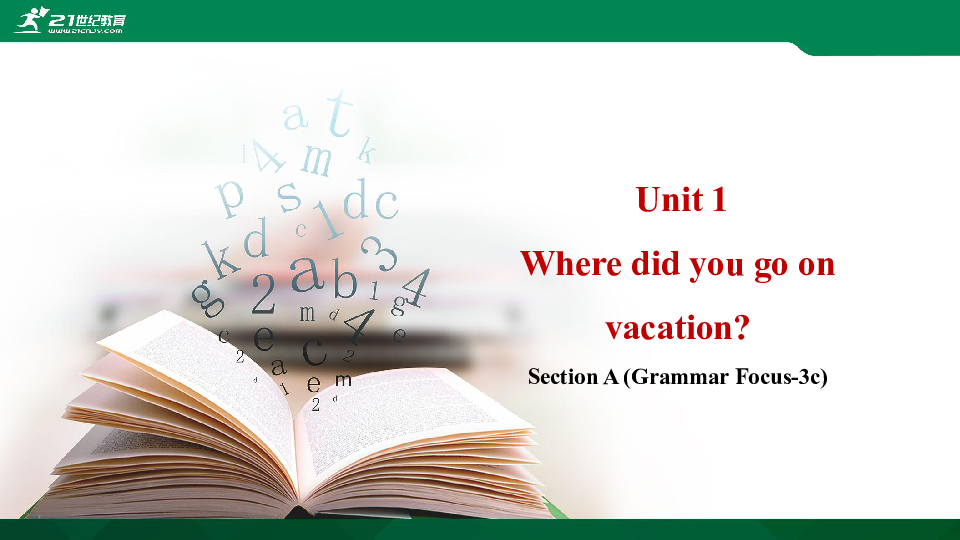(
课件网) Unit 1 Where did you go on vacation? Section A (Grammar Focus-3c) Where did you go on vacation? I went to the Great Wall. Review Where did they go on vacation? They went to the museum. Review She visited the USA. She went to New York City. Where did she go on vacation? Review They went to summer camp. Where did they go on vacation? Review He went to the mountains. Where did he go on vacation? Review Where did they go on vacation? They stayed at home. Review They visited their teacher. Where did they go on vacation? Review Where did you go on vacation? I went to New York City. Did you go out with anyone? No. No one was here. Everyone was on vacation. Did you buy anything special? Yes, I bought something for my father. No, I bought nothing. How was the food? Everything tasted really good! Did everyone have a good time? Oh, yes. Everything was excellent. Grammar 一般过去时 构成 用法 动词的过去式 1. 表示过去某个时间发 生的动作或存在的状态。 2. 表示过去经常或 反复发生的动作。 (the day before) yesterday last night / week in 1990 / just now刚才 On Sunday morning two days ago 一般过去时 常用时间 Grammar Past 过去 Now 现在 go to the movies do my homework play tennis play soccer clean the room went to the movies did my homework played tennis played soccer cleaned the room Grammar 1. 动词be的变化: was were am is are 2. 助动词do的变化: do→ did (在过去时里助动词do没有人称和数的变化) 如: Did you play soccer yesterday? Did he play soccer yesterday? Grammar 动词过去式 的构成 规则动词 regular verbs 不规则动词 irregular verbs Grammar (1) 一般情况下在动词后加-ed。 e.g. play— visit— walk— clean— (2) 以不发音的e结尾的词,在词尾加-d。 e.g. note— like— dance— name— (3) 以一个辅音字母加一个元 音字母加一个辅音字母结尾的(两辅夹一元)并且最后一个音节重读的单词,要先双写这个辅音字母,再加-ed。 e.g. stop— drop— plan— (4) 以辅音字母加y结尾的单词,先改y为i,再加-ed。 e.g. study— carry— played visited walked cleaned noted liked danced named stopped dropped planned studied carried spend keep stand sing wear pay read teach sell think write speak make find eat sleep wake put leave ride buy take feel fight spent kept stood sang wore paid read taught sold thought wrote spoke made found ate slept woke put left rode bought took felt fought 不规则变法 Grammar 3.用法 (1)含be 动词过去时的句式 否定句是在was\were后面加not,即was not (wasn’t)\were not(weren’t)。 一般疑问句是把was\were提前放到句首,且首字母要大写。 Eg: I was at home last night. →否定句_____ →一般疑问句 _____ 肯定/否定回答:_____ 就划线提问:_____ I wasn’t at home last night. Were you at home last night? Yes, I was./ No, I wasn’t. Where were you last night? Grammar She was a student. 变为否定句: 变成疑问句: 肯定回答: 否定回答: 对画线部分提问: Who was she? No, she didn’t. Yes, she did. Was she a student. She wasn’t a student. They were my good friends. 变为否定句: 变成疑问句: 肯定回答: 否定回答: 对画线部分提问: They w ... ...

